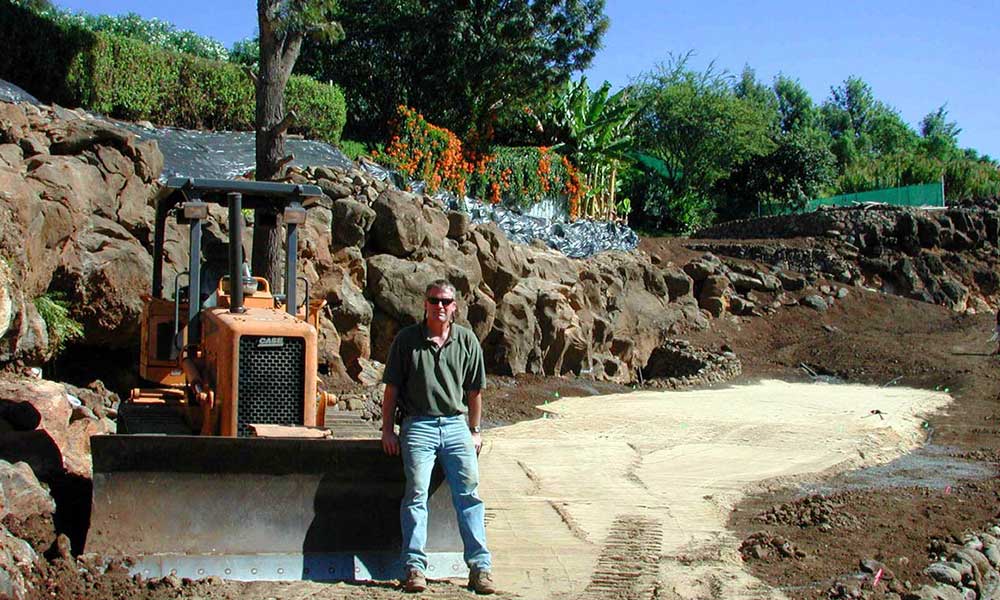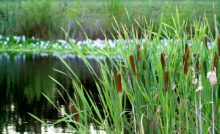Ridgetop Golf (Part 1) – Making the Rounds – Installment 29


Kip working a 3-hole 9-tee mini course in Kula, Hawaii
This column features recollections of the author’s 37 years as a golf writer. These installments stem from his many travels and experiences, which led to a gradual understanding that the game has many intriguing components, especially its people.
I first heard about Ridgetop Golf in the early 1990s when its founder, Kip Kalbrener, began subscribing to my quarterly golf project-tracking publication, “Golf Report Northwest.” He renewed when it morphed into “Golf Report West” and again, in 2000, when I launched www.golfconstructionnews.com, which tracked golf projects around the U.S. (For more on my varied experiences as a golf-development researcher, visit https://www.golfcoursetrades.com/big-hat-no-cattle-golf-developers/.)
The best feedback this writer/publisher could receive from these reports was when subscribers signed a contract for contributing their services, expertise, or equipment for a project. That was my reward for the chronic black-ink-stained fingers from rifling through thousands of printed, local news clippings in search of proposed golf developments, upgrades to existing courses and recent grand openings. Kip, whose home base is Gig Harbor, Wash., was among those who kindly noted that his company benefited from my efforts.
Since the demise of golfconstructionnews.com following the 2008-09 recession – when golf projects dwindled to a trickle and there were scant business leads for subscribers – I’ve been an interested observer of Ridgetop Golf. Recently, I was amazed how the company, under the direction of golf architect David McLay Kidd, transformed my longtime golf club – Sand Point in northeast Seattle – from an often-boggy layout into a scenic gem with dry, firm-and-fast, year-round conditions. Here’s my tale about waking up one morning to a whole new golf course: https://www.golfcoursetrades.com/making-the-rounds-part-10/.
So, after our 30-plus-year connection, it was a good time to get caught up with Kip’s company and its continued growth in an often-fickle industry. Over the decades Ridgetop has become a family affair, with 31-year-old son, Casey, now a partner in the enterprise with Kip and his wife, Nancy. This will be discussed in the second segment of this two-part series.
But first, I wanted to know how Kip got into the golf-construction field and its evolution into a successful family concern.
Jeff Shelley: “What did you do before Ridgetop and why did you get into the golf business? Did you have any mentors?”
Kip Kalbrener: “At age 18 I was an alpine guide on Mount Rainier, where I met my wife, Nancy. I worked at Rainier during the summer and switched over to landscape construction – on ballfields and parks – in the fall/winter/spring.
“I learned my equipment skills while landscaping. My old friend, Scott Burke, of Burke-Darrow Golf Irrigation, gave us our first project lead in 1991 at Glendale Country Club in Bellevue, Wash.
“(Golf architect) John Harbottle III was instrumental in getting my renovation career started. He and I grew up in Tacoma, where we attended competing high schools and became friends. We began working together at Sumner Meadows Golf Links southeast of Tacoma. It was his first 18-hole design and opened in 1995. John involved me in most of his Pacific Northwest course renovations up until his untimely passing in 2012. Our last project together was at Tacoma Country & Golf Club, where my son Casey worked with us.”
JS: “What were some of the early Ridgetop jobs and what lessons did you learn from these initial projects?”
KK: “In 1991, as a subcontractor at Glendale, we expanded the 18th hole pond, rebuilt the 18th green and bunkers. John Steidel was the architect. We then did a bunker-renovation project overseen by Geoffrey Cornish in 1993 at Broadmoor Golf Club in Seattle. The following year at Seattle Golf Club we handled a bunker renovation, built a lake, and reconstructed the greens. Arnold Palmer did the design.
“These early jobs were my ‘learning curve’ in understanding what’s involved in design and construction. I quickly learned what was needed for interpreting a design philosophy and the patience involved in shaping features multiple times to satisfy the architect.”
Though the company’s primary market is the Pacific Northwest, it has worked with golf course architects boasting international reputations. The list includes Harbottle, Steidel, Cornish, Palmer, Rees Jones, Robert Trent Jones Jr., Mark Miller, Jeff Mingay, Dan Hixson, Todd Schoeder, Gene Bates, Tom Fazio, Kidd, David Druzisky and Thad Layton.
Kalbrener made an early decision on the focus of his new business. “In the 1990s, when we began Ridgetop Golf, the trend of new construction was slowing and the local demand in the Pacific Northwest for renovations was rising.”
This was a wise choice, as his projects include reputation-establishing remodels of some top private clubs, resorts, public courses, and municipal facilities in Washington, Oregon, Idaho, Montana, Wyoming, Nevada, Colorado, and Hawaii.
Kalbrener quickly adjusted to the most demanding projects by being innovative. “Bunker renovations were challenging in the beginning because of the logistics of moving product within a course without damaging fairways and cart paths.
“Eventually, we created buggies with large turf tires that leave minimal disturbances. We went from using backhoes to excavators, and basically eliminated tire tracking. Our goal is to leave the projects as if we were never there.”
Ridgetop Golf became uniquely qualified to work in a moderate but often rainy climate. “Most of our competitors are at the national level,” Kalbrener said of other golf construction companies. “We carry an advantage in the Northwest due to our 30 years of experience working in a very wet environment. We have refined our equipment and practices over the years to be very efficient in tough climates and soil conditions.”
Kalbrener was quick to give credit to the golf industry’s core contributors when asked.
JS: What people have been instrumental in making your business sustainable and successful?
KK: “Largely, my relationships with the superintendents I work with. Also, the Golf Course Superintendents Association of America and the USGA’s Green Section reps.”
JS: “How closely does Ridgetop Golf work with superintendents and how do they influence jobsite conditions to support the successful completion of a project?”
KK: “Superintendents are the lifeline of our work. We work closely with the superintendents in the preconstruction phases to understand their needs. They are the ones being left to maintain the product and we feel they should be at the front of the line in any discussions pertaining to our work. The management concerns are critical to the design of the project as well as the construction success.”
Part 1 ends with two questions about the company’s present and future.
JS: “What are the biggest business challenges faced by Ridgetop Golf?”
KK: “Staffing. We have created a very good core of shapers, operators, managers, techs, etc. But seasonal labor is an ongoing challenge.”
JS: “Do you plan to expand Ridgetop Golf’s footprint beyond the Pacific Northwest? If so, please explain.”
KK: “I feel that our team is one of a kind and would look at any projects to prove that outside of the PNW if the right opportunity arose.”
Part 2 will offer more of Kip’s thoughts, input from Casey, and contributions from other members of Ridgetop Golf ‘s family.
For more information, visit https://ridgetopgolf.com/.
Jeff Shelley has written and published nine books as well as numerous articles for print and online media over his lengthy career. Among his titles are three editions of the book, “Golf Courses of the Pacific Northwest.” The Seattle resident was the editorial director of Cybergolf.com from 2000-15. He also co-founded the Northwest Golf Media Association in 1995. For seven years he served as the board president of First Green, an educational outreach program that is now part of the Golf Course Superintendents of America and Environmental Institute for Golf.
Recent Posts
Escondido Golf and Lake Club: A Texas Golfing Treasure that Sets the Standard for Course Maintenance
When you think of a top-tier golf course, several factors come to mind: a stunning…
GCSAA names Joshua Tapp director of environmental programs
Former EPA Region 7 acting deputy regional administrator will provide strategic direction for environmental initiatives…
Circling Raven Golf Club Set to Open April 4; Coeur d’Alene Casino Amenity Unveils New Programs, Enhancements
Coeur d’Alene Casino Resort Hotel will open Circling Raven Golf Club on April 4 (weather…
Noteefy Expands Luxury Island Resort Portfolio with Additions of Casa de Campo, Fairmont Southampton
Casa de Campo Resort & Villas in the Dominican Republic and the Fairmont Southampton in…
Cattails -The Pond’s Drama Queen
Cattails – you’ve seen them. Tall, fluffy, and taking over ponds like they own the…
Carolinas to Honor Pinehurst’s Farren
Pinehurst’s Bob Farren, CGCS will receive this year’s Distinguished Service Award from the Carolina Golf…


